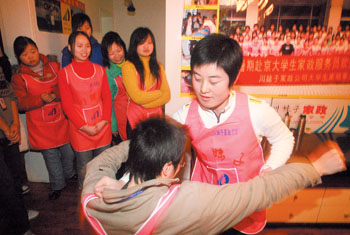Kungfu, bilingual housekeepers new fad in Beijing
By Kang Yi (chinadaily.com.cn)Updated: 2007-01-19 17:15
Housekeepers that can speak fluent English or are skilled in martial arts become a new fad in Beijing, reported the Beijing Morning Post Thursday.
 A police academy graduate practices martial arts drills at a housekeeper fair in this undated photo. [File]  |
A squad of the 24 graduates from Southwest China's Sichuan Province arrived in Beijing Wednesday, and seven landed jobs as housekeepers on the very first day of their capital gold rush with salaries ranging from 1200 (US$154) yuan to 1700 yuan (US$219) per month.
"Your Kungfu is a plus. Do you know how to cook?" an employer surnamed Chen asked a graduate at the Chuan Mei Zi Housekeeping Service Intermediary. Chen said she needs a housekeeper who can cook and safeguard her villa.
According to Song Rui, an agent with the Chuan Mei Zi Intermediary, traditional concepts of a housekeeper are changing and now more resemble a multi-tasking personal assistant. Graduates who can drive and speak English are very popular in Beijing.
However an online survey jointly conducted by the Beijing Morning Post and the Tian Tong Yuan Residential Community shows that most respondents would not prefer a graduate housekeeper as they would have to pay more, but graduates may not be as good at housekeeping.
"Graduates doing housework is a waste of talent," a respondent posted. While another believed talent is already a thing of the past and graduates are nothing more than an ordinary work force.
According to the report, another intermediary in the Tian Tong Yuan Residential Community is giving graduates housekeeper training.
Ten graduates from neighboring Hebei Province are undergoing compulsory training courses to equip them to work as housekeepers. The training courses teach them how to wash and iron clothes, tidy rooms as well as cook.
It is reported that the housekeeper shortage in Beijing is about 100,000, and is still on rise.
|
||
|
||
|
|